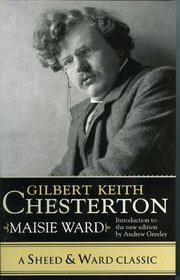Search -
Gilbert Keith Chesterton (Sheed & Ward Classic)
Gilbert Keith Chesterton - Sheed & Ward Classic
Author:
a selection from Chapter 10 - Who is G.K.C.? THE BOER WAR--and the whole country enthusiastically behind it. The Liberal Party as a whole went with the Conservatives. The leading Fabians--Bernard Shaw, Mr. and Mrs. Sidney Webb, Hubert Bland, Cecil Chesterton and the "semi-detached Fabian" H. G. Wells--were likewise for ... more »
Author:
a selection from Chapter 10 - Who is G.K.C.? THE BOER WAR--and the whole country enthusiastically behind it. The Liberal Party as a whole went with the Conservatives. The leading Fabians--Bernard Shaw, Mr. and Mrs. Sidney Webb, Hubert Bland, Cecil Chesterton and the "semi-detached Fabian" H. G. Wells--were likewise for ... more »
ISBN-13: 9780742550445
ISBN-10: 0742550443
Publication Date: 10/28/2005
Pages: 600
Rating: ?
ISBN-10: 0742550443
Publication Date: 10/28/2005
Pages: 600
Rating: ?
0 stars, based on 0 rating
Publisher: Rowman & Littlefield Publishers, Inc.
Book Type: Paperback
Members Wishing: 2
Reviews: Amazon | Write a Review
Book Type: Paperback
Members Wishing: 2
Reviews: Amazon | Write a Review
Genres:
- Biographies & Memoirs >> General
- Biographies & Memoirs >> Leaders & Notable People >> Religious
- Literature & Fiction >> General
- Religion & Spirituality >> General
- Religion & Spirituality >> Religious Studies >> Church & State
- Christian Books & Bibles >> Catholicism >> General
- Christian Books & Bibles >> Catholicism >> Roman Catholicism




